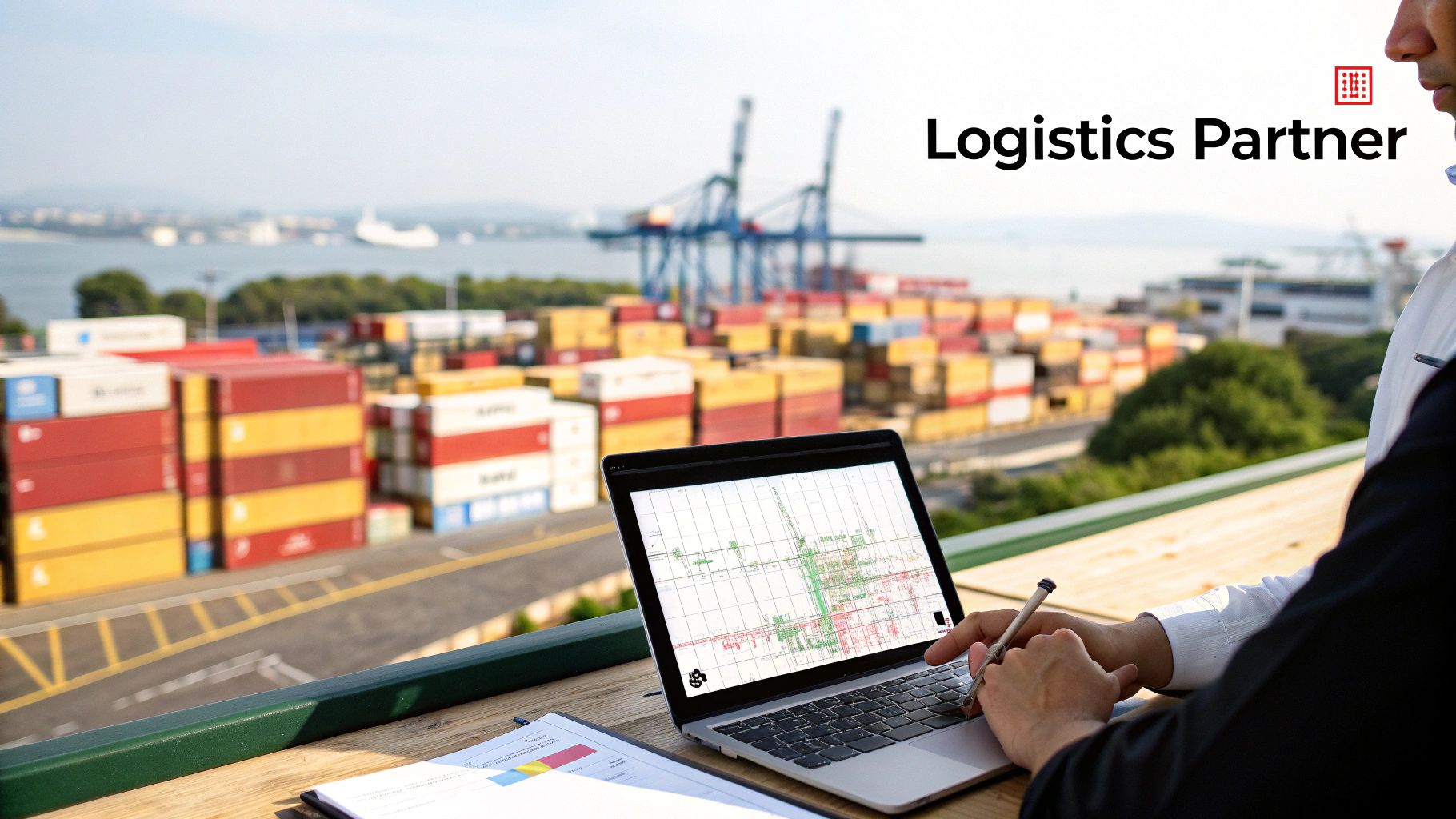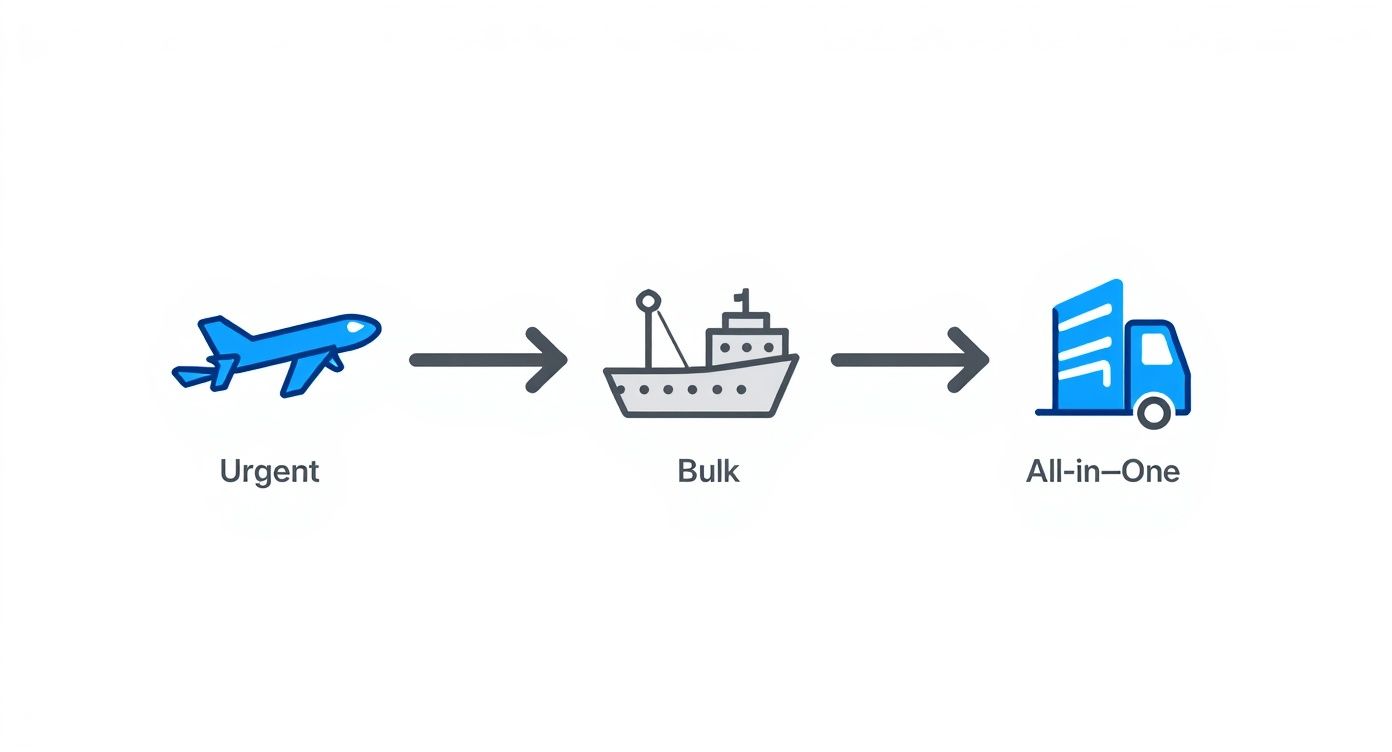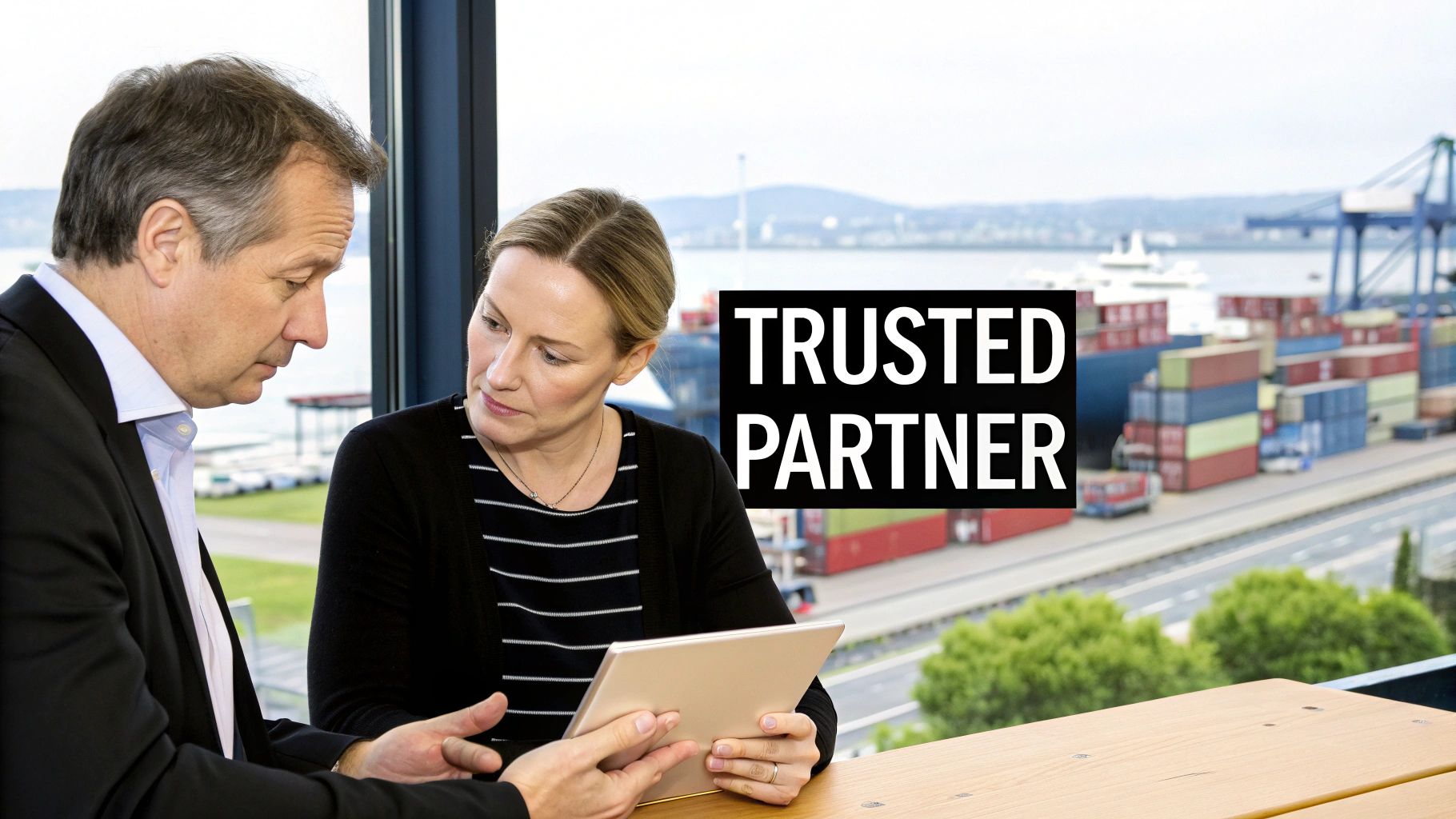Think of a German freight forwarder as your logistics architect. They're the masterminds who orchestrate the entire, often complex, journey your products take from a factory floor in China to a warehouse shelf in Germany. They're essentially the travel agent for your cargo, managing every connection, piece of paperwork, and customs checkpoint along the way to build a smooth, reliable supply chain.
What a German Freight Forwarder Actually Does for You

Picture this: you need to get your latest product line from Shenzhen to Berlin. If you went it alone, you'd be juggling a local Chinese trucker, booking container space on a massive vessel, wrestling with export documents, and then trying to clear everything through strict German customs before finding a final delivery service. It’s a logistical nightmare waiting to happen.
A German freight forwarder steps in and turns that tangled web of tasks into one single, managed service.
They don’t actually own the ships, planes, or trucks. Instead, they act as an expert intermediary. Their real power comes from their deep industry network and the huge volumes they handle, which allows them to negotiate better rates and find the most efficient routes—something most individual businesses could never access on their own. This saves you a significant amount of time, money, and stress.
More Than Just a Booking Agent
The value of a good forwarder goes way beyond just finding space on a ship. They are the strategic planners who prevent costly mistakes and keep your goods moving.
Here's a breakdown of their core responsibilities:
- Finding the Best Route: They analyse your needs and select the right mix of air, sea, or rail transport to hit your deadlines without blowing your budget.
- Managing the Paper Trail: They ensure every document, from the Bill of Lading to the commercial invoice, is filled out perfectly to meet compliance standards.
- Clearing Customs: Acting as your dedicated customs broker, they navigate the complexities of German import regulations to get your shipment cleared without a hitch.
- Solving Problems Before They Start: Experienced forwarders can spot potential delays—like port congestion or a documentation error—and act quickly to fix them.
The freight forwarding market between China and Europe is massive, and German firms are at the heart of it. The China freight forwarding market generated USD 13,055.9 million in a recent year and is on track to hit USD 18,287.5 million by 2030. Giants like DHL Group and DB Schenker are key players here.
A freight forwarder’s main job is to coordinate every single step of the process, from the factory in China to your door in Germany. This brings the kind of stability and predictability that modern businesses depend on.
Ultimately, they serve as your single point of contact. No more chasing down multiple companies in different time zones. For any business sourcing products from China, finding the right forwarding partner is one of the most important decisions you'll make. You can dive deeper into the nuts and bolts by reading our full guide on shipping from China to Germany.
What Do German Freight Forwarders Actually Do? A Look at Core Services
When you start working with a German freight forwarder, you're not just buying a shipping label. You're tapping into a suite of logistics services, each designed for a different kind of business need. Getting this choice right is fundamental—it's about finding the perfect balance between how fast you need your goods, how much you want to spend, and how much hands-on involvement you want.
Let's break down the main options you'll encounter. At the highest level, the decision really boils down to two choices: sending your cargo through the sky or across the ocean.
Air Freight: The Express Lane in the Sky
Think of air freight as the premium courier for your international shipments. It's hands-down the fastest way to move products from a factory floor in China to a warehouse in Germany, often taking just a few days from start to finish. This speed is a game-changer for certain types of goods—think high-value electronics, fast-fashion apparel, or critical medical supplies where every day counts.
Of course, speed comes at a price. Air freight is the most expensive option, but the cost can be justified. Moving products quickly means you don't have to tie up as much cash in inventory sitting on a ship for weeks. For a time-sensitive product launch or an emergency restock, the reliability and velocity of air freight are often worth every penny. A good forwarder handles all the complex airline paperwork and security checks, making it a surprisingly smooth process.
Sea Freight: The Workhorse of Global Trade
On the other side of the coin is sea freight. This is the backbone of the global economy, responsible for moving a staggering 90% of everything we buy and sell. It's dramatically cheaper than flying your goods, making it the go-to choice for anything heavy, bulky, or not needed in a massive rush. If you’re importing furniture, industrial machinery, or large batches of consumer goods, sea freight is almost always the most economical path.
But even within sea freight, you have a couple of important choices to make.
- Full Container Load (FCL): This is exactly what it sounds like—you book an entire shipping container (usually a 20-foot or 40-foot one) just for your products. FCL is generally a bit quicker and more secure than its counterpart because your container is sealed at the origin and isn't opened again until it reaches its final destination.
- Less than Container Load (LCL): Don't have enough product to fill a whole container? No problem. With LCL, your cargo shares space inside a container with goods from other importers. It's a fantastic, cost-effective option for smaller businesses and e-commerce sellers who only need to ship a few pallets at a time. You just pay for the space you use.
The trade-off is pretty straightforward: FCL gives you speed and security for larger shipments, while LCL offers incredible flexibility and cost savings for smaller ones.
And for those who want a completely hands-off experience? There's door-to-door service. This is the all-inclusive package. Your freight forwarder arranges everything: picking up the goods from the factory in China, trucking them to the port, handling all customs formalities in both countries, and managing the final delivery to your warehouse or office in Germany. You get one point of contact and one simple bill for the entire journey. It turns a logistical headache into a simple, managed process.
Comparing Freight Services from China to Germany
To make the choice clearer, here’s a quick breakdown of how these services stack up against each other for the China-to-Germany route.
| Service | Best For | Typical Speed | Relative Cost |
|---|---|---|---|
| Air Freight | High-value, low-volume, or time-critical goods (e.g., electronics, urgent parts). | 3-7 days | Very High |
| Sea Freight (FCL) | Large shipments (15+ cubic metres) where you need a full container. | 30-45 days | Low |
| Sea Freight (LCL) | Smaller shipments (2-15 cubic metres) that don't require a full container. | 35-50 days | Moderate |
| Door-to-Door | Businesses seeking a hassle-free, all-in-one solution with a single point of contact. | Varies by mode | Varies |
Ultimately, the right service depends entirely on your product, your budget, and your timeline. A good German freight forwarder won't just present you with a price list; they'll help you understand these trade-offs to build a shipping strategy that truly supports your business goals.
Navigating German Customs and Import Regulations
If there's one thing that can derail an international shipment, it's customs. A single mistake on a form can bring a valuable container to a dead stop, racking up storage fees, delays, and painful fines. For anyone importing from China to Germany, getting customs right isn't just a good idea—it's essential for keeping your supply chain moving.
Think of customs clearance like a final exam for your cargo. Your freight forwarder is the seasoned expert who makes sure you pass with flying colours. They're in charge of a critical set of documents, and every detail has to be spot on.
- Commercial Invoice: This is the core document. It breaks down the sale between you and the supplier, detailing the goods, their value, and their Harmonized System (HS) codes.
- Bill of Lading (B/L) or Air Waybill (AWB): This is the contract between the shipper and the carrier. It’s the official receipt and travel itinerary for your goods.
- Packing List: This document gives customs officials a granular look at what's inside each box, including weights and dimensions.
- Certificate of Origin: This paper trail proves where your goods were made, which is crucial for calculating the correct duties.
This infographic breaks down the main shipping options that will shape your customs process, from time-sensitive air freight to cost-effective sea freight.

As you can see, whether you choose air, sea, or a full door-to-door service, each path has its own logistical hurdles that a good forwarder will seamlessly navigate for you.
The Forwarder as Your Customs Broker
A German freight forwarder does much more than just shuffle paperwork. They serve as your licensed customs broker—and this might be the most critical role they play. They become your official representative, liaising directly with the German customs authorities, known as the Zoll.
This means they're responsible for classifying your products under the correct HS codes to figure out the exact import duties and taxes owed. One slip-up here could mean you overpay, or worse, face penalties for underpayment. They also manage the crucial calculation and payment of Value Added Tax (VAT). You can get a deeper look into this in our guide on how VAT is handled for imports from China.
A skilled forwarder doesn't just process paperwork; they anticipate issues. They know the common red flags that customs officials look for and ensure your declarations are compliant from the start.
Another absolute must-have is an EORI number (Economic Operators Registration and Identification). This unique ID is mandatory for any business bringing goods into the European Union. Without an EORI number, your shipment is going nowhere—it will be held at the border. Your forwarder will make sure this is sorted out well before your cargo even lands.
The deep expertise of German freight forwarders isn't just for imports, either. They are the engine behind Germany's huge export volume to markets like China, which recently hit an incredible US$97.73 billion in a single year. Their mastery of complex regulations is what makes that kind of trade possible, keeping goods flowing smoothly in both directions.
How to Choose the Right German Freight Forwarder

Choosing the right German freight forwarder isn't just about finding the cheapest quote. It’s about finding a reliable logistics partner. A rock-bottom price is worthless if your cargo gets tied up in customs or your forwarder goes silent when you need them most.
Think of the right partner as an extension of your own team—someone who gets ahead of problems and manages your supply chain to prevent expensive delays. To find that partner, you need to dig deeper than the initial quote. The best German freight forwarders bring a mix of a strong network, clear communication, and modern tech to the table.
What does that look like in practice? A top-tier forwarder will have their own offices or trusted agents in both your origin country, like China, and at major German hubs like Hamburg or Frankfurt. This dual presence means smooth handovers and local know-how at both ends of the journey.
Evaluating a Forwarder's Capabilities
Start your assessment by looking at their core strengths. Do they have a proven track record on your specific shipping lane, say, from Shanghai to Hamburg? A forwarder moving high volumes on that route likely has better relationships with carriers. That translates to better rates and more reliable container space for you, especially when things get busy.
Communication is just as critical. A forwarder who gives you clear, proactive updates is worth their weight in gold. When you're first talking to them, notice how quickly and thoroughly they answer your questions. If they're slow to respond now, imagine what it'll be like when a real issue crops up.
Technology is the other big piece of the puzzle. A modern forwarder should offer a digital platform where you can get real-time tracking and see all your shipping documents in one place. This kind of transparency lets you keep an eye on your shipment without having to chase down updates over email, giving you much better control over your inventory planning.
The right forwarder doesn’t just move boxes; they provide visibility and peace of mind. Their ability to offer clear tracking, handle documentation flawlessly, and communicate proactively is just as valuable as the physical transportation itself.
When vetting potential partners, a structured approach helps. Here's a table outlining the key areas to focus on during your evaluation.
Key Criteria for Selecting a German Freight Forwarder
A checklist of essential factors to assess when comparing and choosing a logistics partner for your business.
| Evaluation Criteria | Why It Matters | Questions to Ask |
|---|---|---|
| Experience & Specialisation | A forwarder with deep experience in the China-Germany lane understands the specific challenges, from carrier nuances to customs quirks. | How many TEUs do you ship on this route monthly? Do you have experience with my specific product type? |
| Network & Presence | Local teams in both China and Germany ensure smoother handovers and on-the-ground problem-solving. | Do you have your own offices in both countries, or do you use agents? How do you vet your partners? |
| Communication & Responsiveness | Proactive updates and quick responses are vital when delays occur. This is a sign of good customer service. | Who will be my dedicated point of contact? What is your standard response time for inquiries? |
| Technology & Tracking | A digital platform for tracking and document management gives you control and visibility over your supply chain. | Can I see a demo of your tracking portal? How are shipping documents managed and accessed? |
| Carrier Relationships | Strong ties with multiple ocean and air carriers lead to better rates, priority booking, and flexibility. | Which carriers do you have contracts with for the China-Germany route? How do you secure space during peak season? |
| Customs Brokerage | In-house or tightly integrated customs brokerage services prevent costly compliance errors and delays. | Do you handle customs clearance in-house? What is your experience with German import regulations? |
| Cargo Insurance | Proper insurance protects the full value of your goods, as carrier liability is extremely limited. | Can you explain your cargo insurance options and costs? What does your 'all-risk' policy cover? |
Using this framework helps ensure you're making a choice based on capability and reliability, not just the number at the bottom of a quote.
The Importance of Cargo Insurance
One of the most common, and costly, mistakes is overlooking cargo insurance. Many shippers assume carriers are fully liable for lost or damaged goods. The hard truth is their liability is minimal, often capped at a very low amount per kilogramme. It won't come close to covering your actual loss.
Cargo insurance, on the other hand, provides "all-risk" coverage. This protects your goods for their full commercial value against a wide range of potential mishaps during transit. Your forwarder should be able to walk you through the options and costs clearly. Never assume your shipment is protected without it.
Ultimately, picking a forwarder is a balancing act. By focusing on their network, communication style, technology, and how they handle insurance, you can find a true partner who will help your business grow. For a deeper dive into what a forwarder can do for you, check out our guide on freight forwarding services.
Decoding Shipping Costs and Transit Times
"How much will it cost, and when will it get there?"
Ultimately, every logistics decision comes down to these two questions. For the incredibly busy China-to-Germany shipping lane, the answers swing wildly depending on whether you choose air or sea, plus a few other critical factors.
First, let's talk about speed. Air freight is your express ticket, getting goods from China to Germany in as little as 3-7 days. Sea freight, on the other hand, is the long-haul marathon, taking a leisurely 30-45 days just for the port-to-port journey.
Keep in mind, these are just baseline estimates. The real world has a habit of getting in the way. Port congestion, customs hold-ups, or a sudden storm can easily tack on extra days—or even weeks. A seasoned German freight forwarder knows these risks and will build a buffer into their timelines.
Breaking Down a Freight Quote
Now for the money. A freight quote isn’t just one big number; it’s a mosaic of different fees covering each leg of the journey. Understanding this breakdown is the key to avoiding nasty surprises later on.
Here’s what you’ll typically see:
- Base Freight Rate: This is the fundamental charge for getting your cargo from the origin port to the destination port.
- Fuel Surcharges (BAF/FAF): Carriers add these on to account for the ever-changing price of oil. They can fluctuate quite a bit.
- Terminal Handling Charges (THC): This covers the physical work of loading and unloading your container at both ends.
- Customs Clearance Fees: This is what your forwarder charges for navigating the paperwork and bureaucracy of German customs.
- Destination Fees: This bucket includes all the final costs, like import duties, taxes (VAT), and the price of trucking your goods to their final destination.
The sheer volume on this route is staggering. Just look at the Port of Hamburg, which recently handled 2.561 million TEUs in trade with China in a single year. That's nearly 30% of its total container traffic! You can dive deeper into this vital trade connection on hafen-hamburg.de. This massive volume is exactly why you need a forwarder who can expertly manage schedules and find cost-effective solutions.
A detailed, itemised quote is the hallmark of a transparent forwarder. It empowers you to budget accurately and understand exactly where your money is going, preventing hidden fees from eroding your profit margins.
If you want a better grasp of the core principles that drive transport costs—like package weight, dimensions, and destination—it's worth learning how to accurately calculate shipping charges. The underlying logic of how logistics costs are built is universal, and understanding it will make you a much smarter importer.
Common Shipping Mistakes and How to Avoid Them
Getting your shipment from China to Germany smoothly isn't about crossing your fingers and hoping for the best. It's about smart preparation and knowing where things can go wrong. A few simple oversights can easily spiral into expensive delays, turning what should be a profitable shipment into a logistical headache.
By far, the most frequent cause of customs delays is incomplete or inaccurate paperwork. German customs authorities are notoriously thorough. A single missing HS code, a value on the commercial invoice that doesn't match other documents, or a simple typo in an address can get your entire container flagged for a manual inspection. That's a surefire way to get your goods stuck for weeks.
Think of your shipping documents as your passport for your cargo. Before anything leaves the factory, work closely with your supplier and your German freight forwarder to meticulously review every line of the commercial invoice, packing list, and Bill of Lading. A good forwarder will be your second pair of eyes, helping you spot these problems before they even start.
Misunderstanding Incoterms
Another classic blunder is getting tripped up by Incoterms. These little three-letter codes (like EXW, FOB, or DDP) are incredibly important because they define the exact point where responsibility shifts from your supplier to you. Getting them wrong can lead to surprise bills and frustrating arguments.
For instance, if you agree to EXW (Ex Works), you’re on the hook for everything—that includes arranging pickup from the factory floor in China and handling all the export paperwork. On the other hand, with FOB (Free On Board), the seller takes care of all local charges and export customs, getting your goods loaded onto the ship.
Misinterpreting Incoterms is like signing a contract without reading the fine print. You could suddenly be responsible for thousands of dollars in transport and customs fees you assumed your supplier was handling.
Overlooking Cargo Insurance
Finally, a lot of shippers make the risky assumption that if something happens to their goods, the shipping line's basic liability will cover the loss. The hard truth is that carrier liability is legally capped and usually only amounts to a tiny fraction of your cargo's real value.
The only way to truly protect your investment is to get proper all-risk cargo insurance. Your forwarder can arrange this for you. It's a separate policy that covers the full value of your products against loss or damage while they're in transit. For the peace of mind it provides, it's a small price to pay to ensure one bad shipment doesn't sink your business.
Got Questions? We've Got Answers
Stepping into international shipping can feel a bit overwhelming, and it's natural to have a few questions. Here are some straightforward answers to the queries we hear most often about using German freight forwarders for shipments from China.
What's the Real Difference Between a Freight Forwarder and a Carrier?
It's a common point of confusion, but the distinction is actually quite simple.
Think of it this way: a carrier is the company that physically owns the ships and planes, like Maersk or Lufthansa Cargo. They're the ones doing the actual heavy lifting. A freight forwarder, on the other hand, is your logistics expert—the architect of your shipment's entire journey. They don't own the vessels, but they book space on them, coordinate all the moving parts, and handle the mountain of paperwork to get your cargo from A to B.
Essentially, the carrier provides the ride, while the forwarder manages the entire end-to-end trip for you.
What Information Do I Need to Get a Freight Quote?
To get a sharp, accurate quote without any back-and-forth, it's best to have a few key details ready. Coming prepared makes the whole process faster for everyone.
Your forwarder will need to know:
- The pickup address (origin) and the final delivery address (destination).
- The total weight and dimensions (length, width, height) of your shipment.
- A clear description of what the goods are.
- Your preferred shipping mode (air or sea).
- The Incoterms you've agreed on with your supplier (like FOB or EXW).
Incoterms are a huge deal. They clearly define who pays for what and who holds the risk at every single stage of the journey. Nailing this down from the start is the best way to avoid surprise costs later on.
Do I Absolutely Need an EORI Number to Import into Germany?
Yes, you do. It's non-negotiable for commercial shipments.
The EORI (Economic Operators Registration and Identification) number is a unique ID that customs officials use to track every shipment coming into the EU from a non-EU country like China. If you're a business, you have to have one before your goods land.
Trying to import without an EORI number is a recipe for disaster. Your cargo will get stuck at the border, racking up frustrating delays and expensive storage fees. The good news is that your freight forwarder can walk you through the application—it's a relatively simple process that saves you a major headache.

